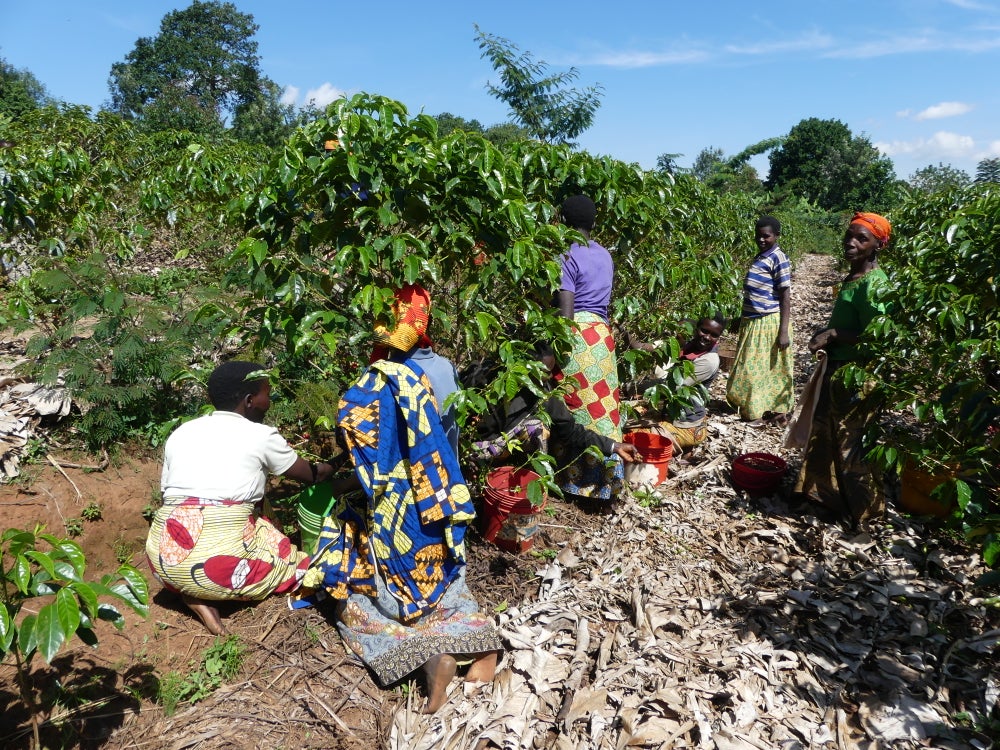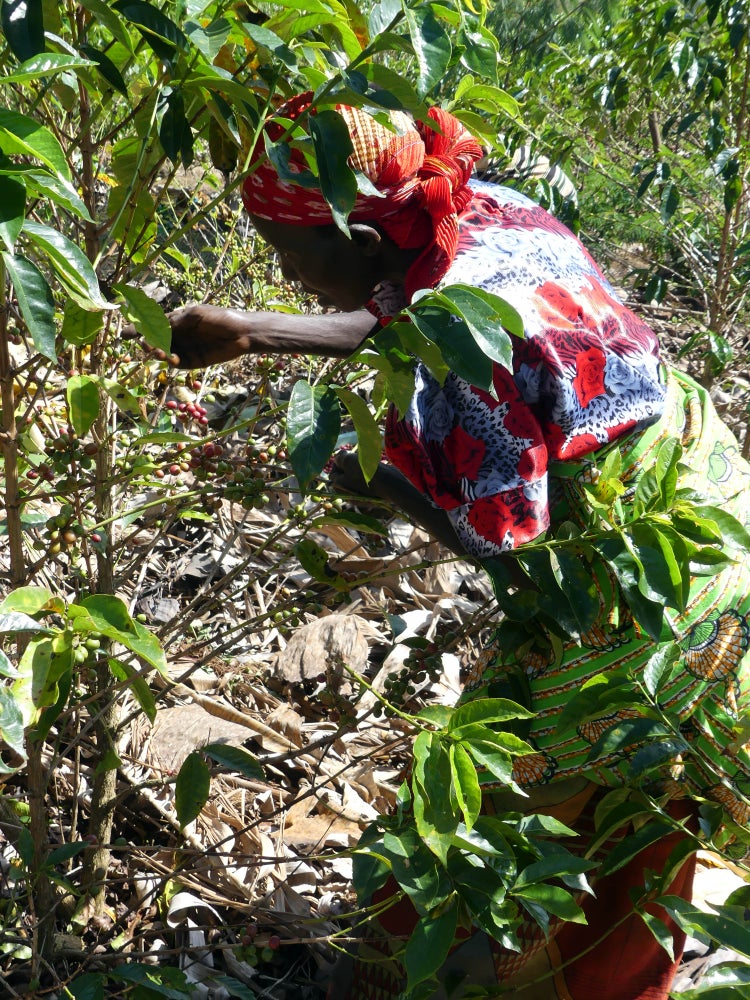About This Coffee
Several years ago, Marie-Annonciate began mobilizing other women in her community (near Mubuga washing station) to band together and gain access to land tenure. In Burundi, women are functionally prohibited from owning land due to patrilineal inheritance laws and the lack of government land codes. Women activists are hard at work advocating change in the government and in legal code. Unfortunately, patriarchal customs continue to dominate, especially in rural areas where they exclude most women from owning their land and make female inheritance nearly impossible.
However, Marie-Annonciate knew that change comes from the people as well as from the government. Her vision and drive gained the support of the Kahawatu Foundation early on. The group also received support from Greenco, a company that oversees washing stations in Burundi.
Kahawatu and Greenco supported the group’s application process. The women lobbied the government for several years but ultimately could not secure their members’ rights to own land as women.
However, even as one door closed, another door opened, and the story didn’t end there. Several individuals noticed the Rama group’s determination in their fight for land rights. In the end, a local community member leased their land to the group.
Cultivation
When the time to own and operate their own land finally arrived, the women of the group were well-prepared to begin farming immediately. Throughout their fight for land, the members of Rama spent time training with Greenco in Good Agricultural Practices and created a financial savings association for the group.
And their hard work paid off. Nizigiyimana Françoise, the president of the Rama Women’s Association in 2018, told visiting representatives from Sucafina that, because they were successfully applying Good Agricultural Practices on both individual and communal farms, members had seen an average increase in production from 0.7kg per tree to 2kg per tree.
The Rama women’s association produced its first crop in 2017. Before their first crop, they spent two years preparing the land and established a model plantation with healthy trees. Alongside coffee, the member farmers also grow beans, vegetables and potatoes and keep livestock to produce organic fertilizer for the farms.
Harvest & Post-Harvest
Rama members selectively handpick cherry and deliver it to Mubuga washing station, where their cherry maintains traceability through the entire process. Quality assurance begins as soon the members deliver their cherry.
Cherry is wet processed under constant supervision. All cherry is floated in small buckets as a first step to check quality. After floating, the higher quality cherry is sorted again by hand to remove all damaged, underripe and overripe cherries.
Following sorting, cherry is then transported directly to the drying tables where it will dry slowly for 3 to 4 weeks. Cherry is laid out in a single layer. Pickers go over the drying cherry for damaged or defective cherry that may have been missed in previous quality checks. The station is very strict about allowing only the highest quality cherry to complete the drying process. Cherry is covered with tarps during periods of rain, the hottest part of the day and at night.
Once dry, cherry is then bagged and taken to the warehouse. Greenco’s team of expert cuppers assess every lot (which are separated by station, day and quality) at the lab. The traceability of the station, day and quality is maintained throughout the entire process.
Quality Control at Greenco
Washing stations make the first payment to farmers between 15 and 30 June. The second payment comes later in the summer. If the coffee wins a competition or sells for extremely high specialty prices, Greenco gives another payment approximately a year after the harvest season.
Once dry, the parchment is bagged and taken to the warehouse. Greenco’s team of expert cuppers assess every lot (which remain separated by station, day and quality) at the lab. This level of traceability is maintained throughout the entire process.
Before shipment, coffee is sent to Budeca, Burundi’s largest dry mill. The coffee is milled and hand sorted by a team of hand-pickers who look closely at every single bean to ensure zero defects. It takes a team of two hand-pickers a full day to look over a single bag. UV lighting is also used on the beans and any bean that glows (which is usually an indication of a defect) is removed. The mill produces an average of 300 containers of 320 bags per year.
Budeca is located in Burundi’s new capital city, Gitega. The city has a population of around 30,000 people. Since there are approximately 3,000 people working at the mill, mostly as hand pickers, this means that Budeca employs nearly 10% of the total population in Gitega for at least half the year (during the milling season). The same is true in the provinces of Ngozi and Kayanza, where Greenco and Bugestal are the first employers in the region during the coffee harvest season. This has an incalculable impact on a country like Burundi, which has unemployment rates above 50%, especially in rural areas and among young people.
About the Kahawatu Foundation
In collaboration with the Kahawatu Foundation, Sucafina works to create positive social impact in the coffee supply chain. Kahawatu works directly with producers to offer programs that focus on agricultural training, improving social justice and economic empowerment. Some of their projects include: livestock solidarity chains, composting, distribution of seedlings, soil analysis, crop diversification, gender inclusion workshops, workshops for youth, village savings and loans groups, and health and nutrition workshops.
About Greenco
Greenco, a company that oversees and structures washing stations in Kayanza province of Burundi, gives washing stations and producers support all along the production chain. They started their work in 2015, and have dominated all Cup of Excellence competitions in Burundi ever since. Currently, Greenco has 13 washing stations all located in Kayanza in the north of Burundi. The producers receive support from the Greenco CWS managers, who are all agronomic engineers. Greenco’s overall impact through these 13 central washing stations (CWS) extends to over 15,210 coffee producing households.
Greenco works with young agronomy graduates to provide farmer training and manage washing stations. Young graduates are particularly well suited for the work with Greenco because they can all work with computer systems, greatly simplifying the flow of information between the washing stations and Greenco. Also, they have a fresh and systematic approach to coffee production and processing, with up-to-date knowledge about farming practices. The agronomists received additional training from the NGO Kahawatu Foundation on best agricultural practices (BAP). Off season, they provide agronomy assistance to the roughly 15,210 farmers who deliver cherries to Greenco CWS to prepare for the next harvest.
Another socio-economic challenge that Greenco addresses is youth unemployment. The national youth unemployment rate is almost 50%. At Greenco, young graduates receive a decent salary and benefits (house, motorbike, healthcare) as well as real career prospects.
Next to improving quality and productivity, Greenco strives to improve socio-economic and environmental conditions around the washing stations. All of their washing stations have UTZ and 4C certification. One of their focus points is building an efficient supply chain around the CWS. Greenco is buying 93% of its cherries directly from farmers via collection centers. This way, they improve farm-gate price to the producers.
In addition to providing training on farming practices, Greenco organizes trainings for farmer groups about various social aspects. Coffee families learn about gender equality, financial planning, family planning and more.
Environmental stewardship is of paramount importance to Greenco. They have equipped all washing stations with water treatment facilities and solar panels and batteries. The station has ponds to purify the wastewater from processing before flowing back in the river network. The solar panels provide energy for computers, lighting and smartphones.
Coffee in Burundi
Burundi has long been overlooked in comparison to its neighboring East African specialty coffee producing powerhouses. However, Burundi season, for us, is one of the highlights of the annual coffee calendar. The country’s coffee is produced almost entirely by smallholder farmers, and much of this small-scale production is of exceptional quality. With its super sweet, clean and often floral coffees, Burundi, every year, is increasingly is putting itself on the specialty coffee map.
Coffee is of paramount importance to families and the country at large. Considering this, improving and expanding coffee infrastructure is not just a way to improve incomes, it is a way to revolutionize the earning potential of an entire nation.
Building washing stations and expanding agricultural extension work can be great ways to improve coffee quality. Washing stations are pivotal in improving cup profile standards and the global reputation of Burundian coffee.
Both state-owned and private actors drive Burundi’s coffee industry and play key roles as washing station management companies and exporters. State-owned companies are called Sogestals, short for “Sociétés de Gestions des Stations de Lavage” (Washing station management companies). Privately-owned companies can operate under a variety of different names.
Sucafina’s history in Burundi goes back to 2007 when Bucafe/Sucafina Burundi was established in Bujumbura. Through Bucafe, we work with several privately-owned washing station management companies and exporters. Our work bridges the entire supply chain, allowing us to be vertically integrated. Our supply chain is solid, reliable and transparent. Due to this, we are more efficient, able to supply better value and positioned to offer both producers and consumers of Burundian coffee a diversity of expertise.

